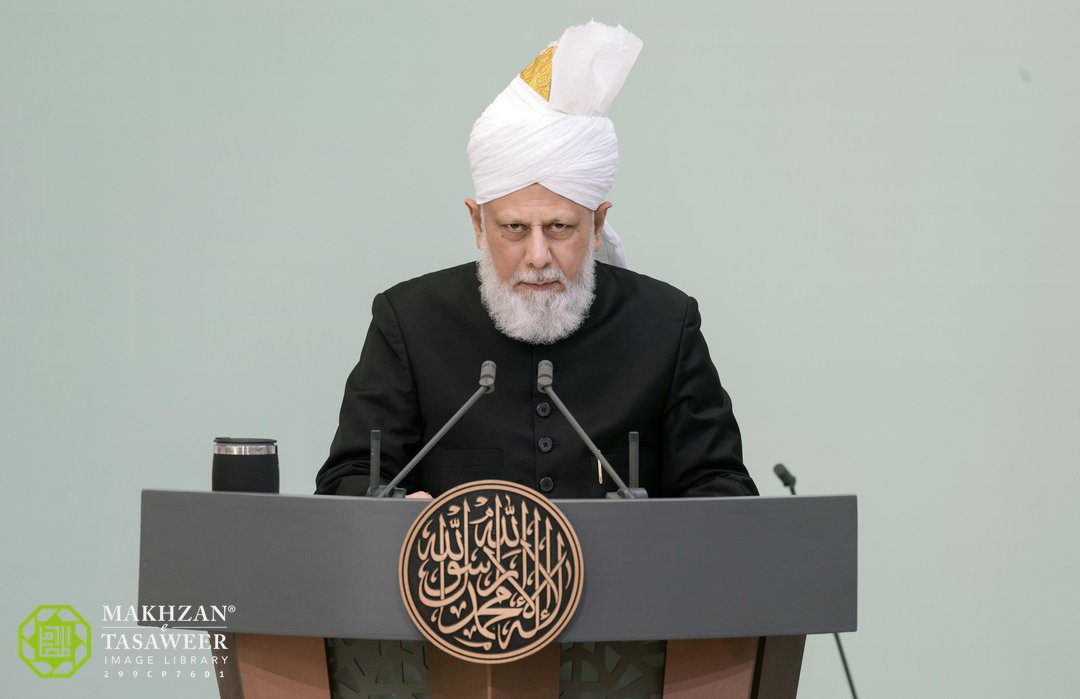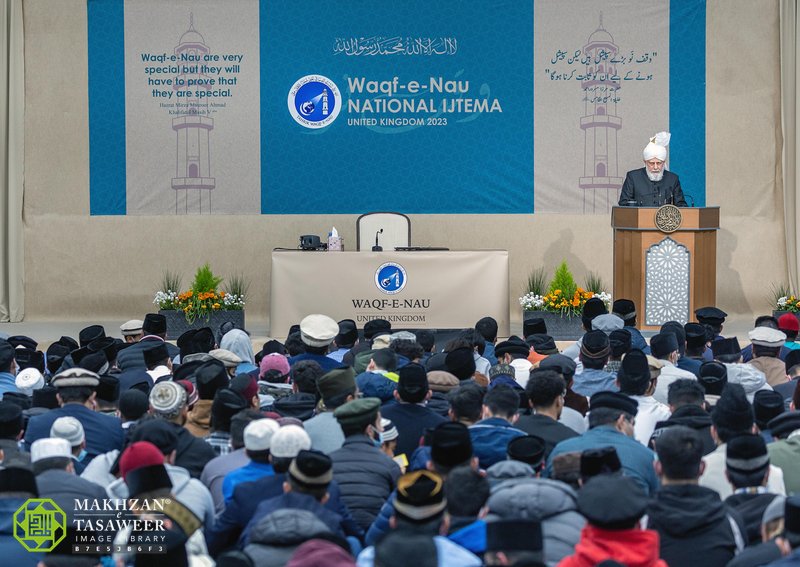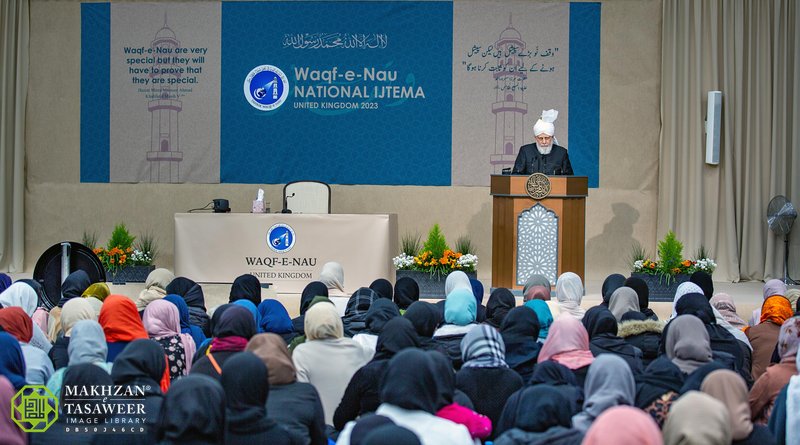
“Be Ever Willing to Go Against the Grain by Giving Precedence to Your Religious Convictions” – Head of Ahmadiyya Muslim Community Addresses Female Muslim Youth Event (Waqfat-e-Nau Ijtema) in London
“Feel pride in your religious beliefs and be confident in the expression of your faith” – Hazrat Mirza Masroor Ahmad
On 29 April 2023, the World Head of the Ahmadiyya Muslim Community, the Fifth Khalifa (Caliph), His Holiness, Hazrat Mirza Masroor Ahmad addressed the concluding session of the UK National Waqfat-e-Nau Ijtema, an annual gathering held for female members of the Ahmadiyya Muslim Community in the UK who have pledged their lives for the peaceful service of Islam.
The event took place at the Baitul Futuh Mosque in London and was attended by more than 1600 women and girls, including more than 1,200 members of the Waqf-e-Nau scheme.
During an inspirational address, His Holiness spoke in detail about the grand responsibilities of the members of the Waqf-e-Nau Scheme and highlighted what their pledge of giving precedence to their faith truly means.
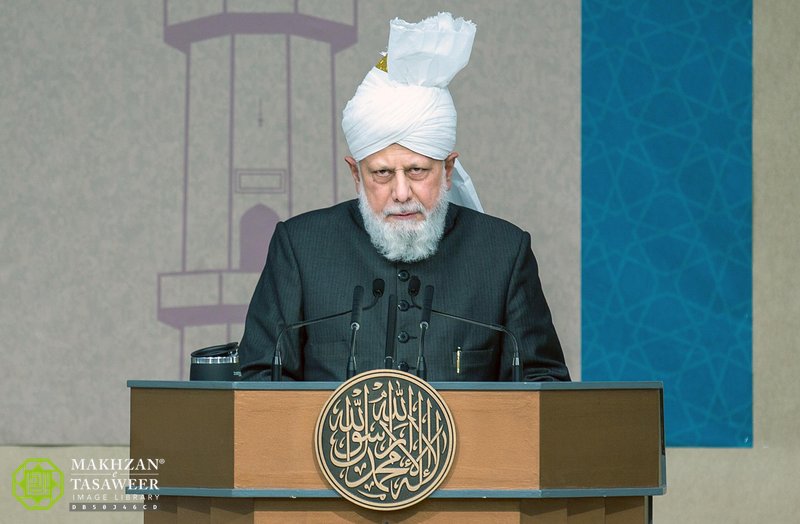
Hazrat Mirza Masroor Ahmad said:
“Once you comprehend what it means to prioritise and value your faith above all else, it will have a profound effect upon how you live your life. It will drive you towards a process of self-reformation and enable you to serve the Ahmadiyya Muslim Community in the best possible way. A person who gives priority to their faith as a Muslim will naturally be inclined towards living a moral life. Such a person will seek to instil within themselves those values and qualities Islam advocates. If you consider your faith to be pre-eminent, you will also have an extremely positive influence on others and the society at large.”
His Holiness said that the Waqfat-e-Nau must recognise their “true value and status” at a time when the world is becoming increasingly godless.
During his address, His Holiness outlined various responsibilities of the Waqfat-e-Nau, fulfilling which will help them to excel in their objectives.
Speaking about the paramount importance of observing the five daily prayers and reciting the Holy Quran, Hazrat Mirza Masroor Ahmad said:
“As members of Waqfat-e-Nau, you must always protect and safeguard your prayers. Consider Salat to be your constant companion. It should not be that you delay or miss any prayers because of your worldly affairs or education. Do not be lazy or fall prey to weak excuses that take you away from Allah’s worship. Rather, ensure you offer Namaz on time and with deep care and concentration.”
Hazrat Mirza Masroor Ahmad further said:
“As Waqfat-e-Nau, you have pledged your lives for the service of your faith and so it is especially incumbent upon you to study the Quran and identify its various teachings. Every command of the Holy Quran is vitally important and must not be taken lightly.”
His Holiness went on to speak about the importance of the Islamic injunctions of observing modesty in dress and conduct.
Hazrat Mirza Masroor Ahmad said:
“Allah the Almighty says that believing women should protect their chastity and modesty at all times and observe Purdah. A fundamental reason for this Quranic injunction is to safeguard and protect women from harassment by men and to ensure that no man dares to cast even an inappropriate glance in their direction or to have impure or ill thoughts towards them. Rather than restricting a woman, Hijab is the means of liberating them from the gaze of men.”
Hazrat Mirza Masroor Ahmad further stated:
“It is true that in the non-Muslim world, the concept of Purdah and Hijab has long been criticised. Yet now, certain non-Muslims are actually calling for safeguards that mirror Islam’s teachings. They are coming to realise the need for caution following reports of countless cases of men harassing and abusing women at all levels of society.”
His Holiness gave examples of recent surveys that showed the rampant levels of sexual abuse faced by women, with one survey finding that across all age-ranges, 70% of women said they had faced sexual harassment in public.
Commenting on this, Hazrat Mirza Masroor Ahmad said:
“As a result, there have been calls to establish ‘safe spaces’ for women or to have ‘women only’ events. Similarly, recently, a new report found that many women and girls in the UK were leaving sports and exercise because they felt uncomfortable and as though they were being sexualised by being forced to wear sports kits that exposed much of their bodies.”
Hazrat Mirza Masroor Ahmad further stated:
“Thus, you should never harbour any form of inferiority complex or embarrassment regarding Hijab or any other of Islam’s teachings. Instead, you should feel pride in your religious beliefs and be confident in the expression of your faith. Certainly, there is no Islamic injunction or restriction that is without reason or logic. Each Islamic teaching is based upon human nature and the means for ensuring societal peace and harmony.”
His Holiness went on to speak about the lofty standards of truthfulness that the Waqf-e-Nau members must adhere to as per the teachings of Islam.
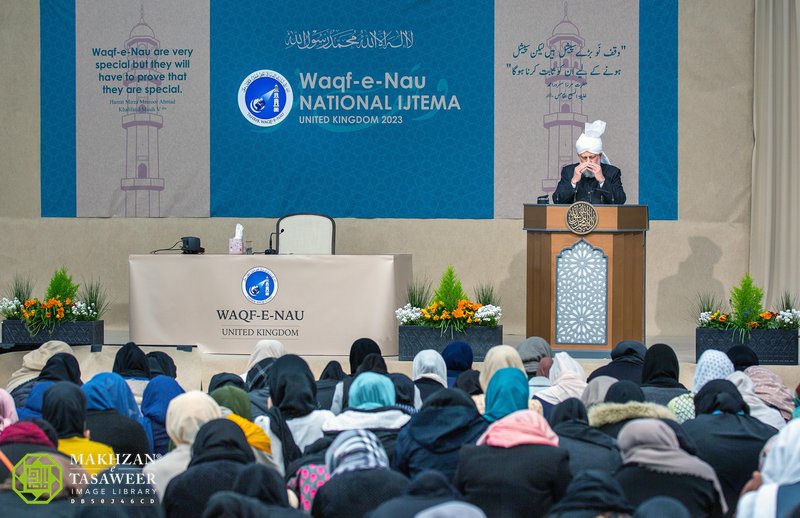
His Holiness also observed that many Waqfat-e-Nau had now become mothers and so they had the added responsibility of training their future generations to face the growing challenges of living a pious life in an increasingly materialistic world.
Hazrat Mirza Masroor Ahmad said:
“Ahmadi Muslim mothers must manifest the highest standards of the worship of Allah and inculcate within themselves the very best morals. Most of you have been brought up and educated here and so you understand this society and recognise its ills and vices. Utilise this knowledge to not only save yourselves from its ill-effects but also to guide your children so that they avoid the moral pitfalls and traps that await them as they grow and develop. Without a shadow of doubt, it is a great challenge of the time for Ahmadi mothers to ensure that our future generations remain attached to their religion.”
During his address, His Holiness said that Waqfat-e-Nau must “take inspiration from those noble women of the past who attained the highest spiritual ranks.”
Hazrat Mirza Masroor Ahmad gave example of the female disciples of Prophet Jesus (peace be upon him) and said:
“After Jesus (as) was taken down from the cross and emerged from the tomb-like cave in which he remained for three days, it was Mary Magdalene and two other women who came to his aid, despite facing the threat of grave punishment and retribution from the authorities. Those brave women did not recoil in fear. Rather, they showed far more courage and devotion than the male disciples.”
His Holiness also said that during the lifetime of the Holy Prophet Muhammad (peace and blessings be upon him), the sacrifices made by female companions “reached new heights and shall forever remain an example for mankind.”
His Holiness gave several examples from the early history of Islam.
Speaking of one husband and wife who bore extreme hardship for the sake of their faith, Hazrat Mirza Masroor Ahmad said:
“Once, the Holy Prophet (peace and blessings be upon him) observed a Muslim husband and wife, both of whom were slaves, being horrifically tortured in this way by their merciless master. They were forced to lie in the blistering heat upon boiling sands and were relentlessly beaten as burning coals and hot stones were placed upon them. All the while, their owner demanded they renounce their belief in the Holy Prophet (peace and blessings be upon him). Despite their agony, they never once wavered in their faith. Upon observing their torment, the Holy Prophet (peace and blessings be upon him) became overwhelmed with emotion and grief and turned to Allah in prayer. The Holy Prophet (peace and blessings be upon him) then addressed the Muslim husband and wife and counselled them to remain patient and gave them the glad tiding that they would receive the greatest of Allah’s rewards and bounties in the Hereafter.”
Continuing the story, Hazrat Mirza Masroor Ahmad said:
“Ultimately, as a result of the incessant torture, the husband lost his life. At that moment, when the Muslim lady had lost her husband, her owner still failed to show any mercy. Instead, he took a spear and violently pierced open her stomach causing her death. In worldly terms, that woman had no rank or status. Indeed, as a slave, she was part of the weakest class of society and considered no more than a chattel or property of her owner. Yet due to her absolute conviction in the truth of the Holy Prophet (peace and blessings be upon him) and her impeccable standards of faith, that lady, who the world looked down upon, scaled the highest spiritual peaks and her noble status has been etched indelibly in history forevermore.”
As His Holiness concluded his address, he advised the Waqfat-e-Nau and said:
“Every Ahmadi Muslim lady and girl, especially members of Waqfat-e-Nau, must understand that now it is their turn to take up the mantle of being ready for every possible sacrifice for the sake of their faith. There are countless moral ills and vices prevalent in today’s society and, increasingly, people are abandoning religion. Under such circumstances, Waqfat-e-Nau must take a stand for the sake of Allah the Almighty. You must strive to eradicate all traces of worldliness from your minds and ensure that you do not fall prey to the superficial attractions and glamour of the world. Instead, seek to live your lives according to Islam’s teachings.”
Hazrat Mirza Masroor Ahmad continued:
“Be ever willing to go against the grain by giving precedence to your religious convictions. Guard your faith and seek to establish an everlasting living bond with Allah. Bow before Him in all humility and sincerely pray that you can affect a profound change in the world through spreading the peaceful message of Islam and [through] your righteous conduct. Strive every day to play your role in uniting mankind under the banner of the Holy Prophet (peace and blessings be upon him) so that the people of the world join together as one in prostration before Allah the Almighty. If you rise to this challenge, you will fulfil the objectives of your life and be able to claim that you are a Waqf-e-Nau not just in name but, far more importantly, in spirit and deed.”
